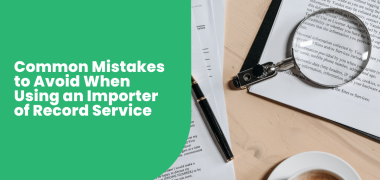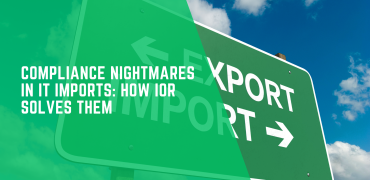In the world of international trade, an Importer of Record (IOR) plays a crucial role in ensuring that your goods comply with local laws and regulations, manage customs documentation, and pay necessary duties and taxes. However, selecting and using an IOR service can be fraught with challenges. Avoiding common mistakes can help streamline your import process, prevent costly delays, and ensure compliance. Here are some common mistakes to avoid when using an Importer of Record:
1. Failing to Understand the Role of an IOR
One of the most fundamental mistakes is not fully understanding what an IOR does and how critical their role is. An IOR is responsible for:
- Ensuring Compliance: They ensure your goods meet all local laws and regulations.
- Documentation Management: They handle all necessary customs documentation.
- Duty and Tax Payment: They ensure all required duties and taxes are paid.
- Securing Permits: They secure any necessary licenses and permits for the import process.
Understanding these responsibilities is essential for making informed decisions and effectively managing your imports.
2. Not Conducting Thorough Research
Another common mistake is not thoroughly researching potential IOR service providers. Here’s what you should do:
- Check Experience and Expertise: Ensure the provider has experience in your industry and with the types of goods you are importing.
- Evaluate Reputation: Look for reviews, testimonials, and case studies. Consistent complaints or negative feedback are red flags.
- Verify Compliance Record: Confirm that the provider has a strong track record of compliance with customs regulations.
3. Overlooking Service Details
Failing to scrutinize the details of the IOR service can lead to significant issues:
- Range of Services: Ensure the provider offers all the services you need, such as documentation, customs clearance, and duty management.
- Technology and Tools: Check if they use modern technology for real-time tracking and updates.
- Customer Support: Reliable customer support is crucial. Ensure they can assist promptly if issues arise.
4. Ignoring Cost Transparency
Cost is an important factor, but focusing solely on the lowest price can be a mistake:
- Transparent Pricing: Look for providers with clear pricing structures and be wary of hidden fees.
- Value for Money: Consider the overall value provided, including expertise, reliability, and additional services.
5. Skipping References and Case Studies
Not asking for references and case studies can leave you without valuable insights:
- References: Contact their references to get firsthand feedback on their services.
- Case Studies: Review case studies to see how they have handled similar import scenarios and assess their problem-solving capabilities.
6. Failing to Define Roles and Responsibilities
A lack of clarity about roles and responsibilities can lead to misunderstandings and inefficiencies:
- Clear Agreements: Ensure you have a clear agreement that outlines the responsibilities of both parties.
- Regular Communication: Maintain regular communication with your IOR to stay updated on the import process and address any issues promptly.
7. Overlooking Compliance Changes
Regulations and compliance requirements can change frequently. Failing to stay updated can result in non-compliance:
- Regular Updates: Ensure your IOR keeps you informed about changes in regulations and compliance requirements.
- Proactive Compliance: Work with your IOR to proactively address any potential compliance issues.
Conclusion
Using an Importer of Record is essential for smooth and compliant international trade operations. By avoiding common mistakes such as failing to understand the IOR’s role, not conducting thorough research, overlooking service details, ignoring cost transparency, skipping references, failing to define roles, and overlooking compliance changes, you can ensure a more efficient and trouble-free import process. Choosing the right IOR and managing the relationship effectively can help you focus on growing your business while leaving the complexities of international trade to the experts.




